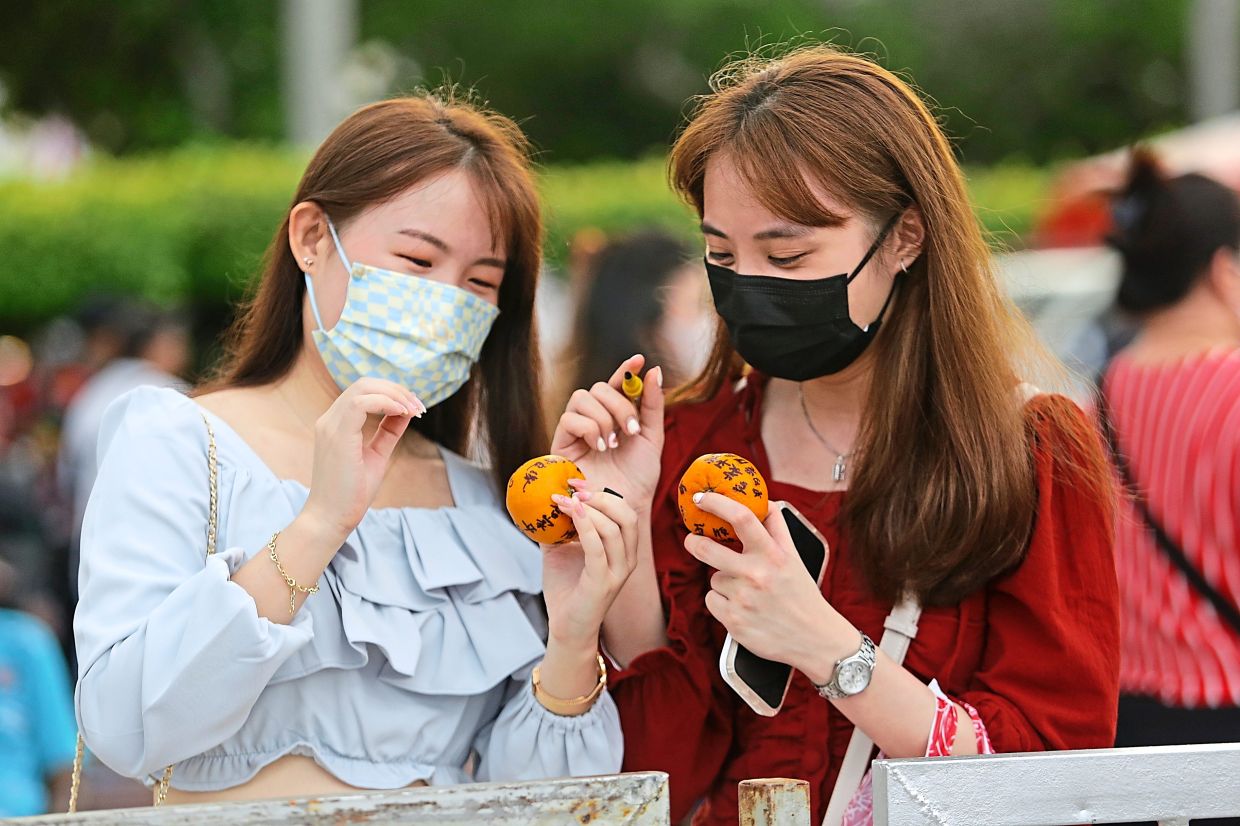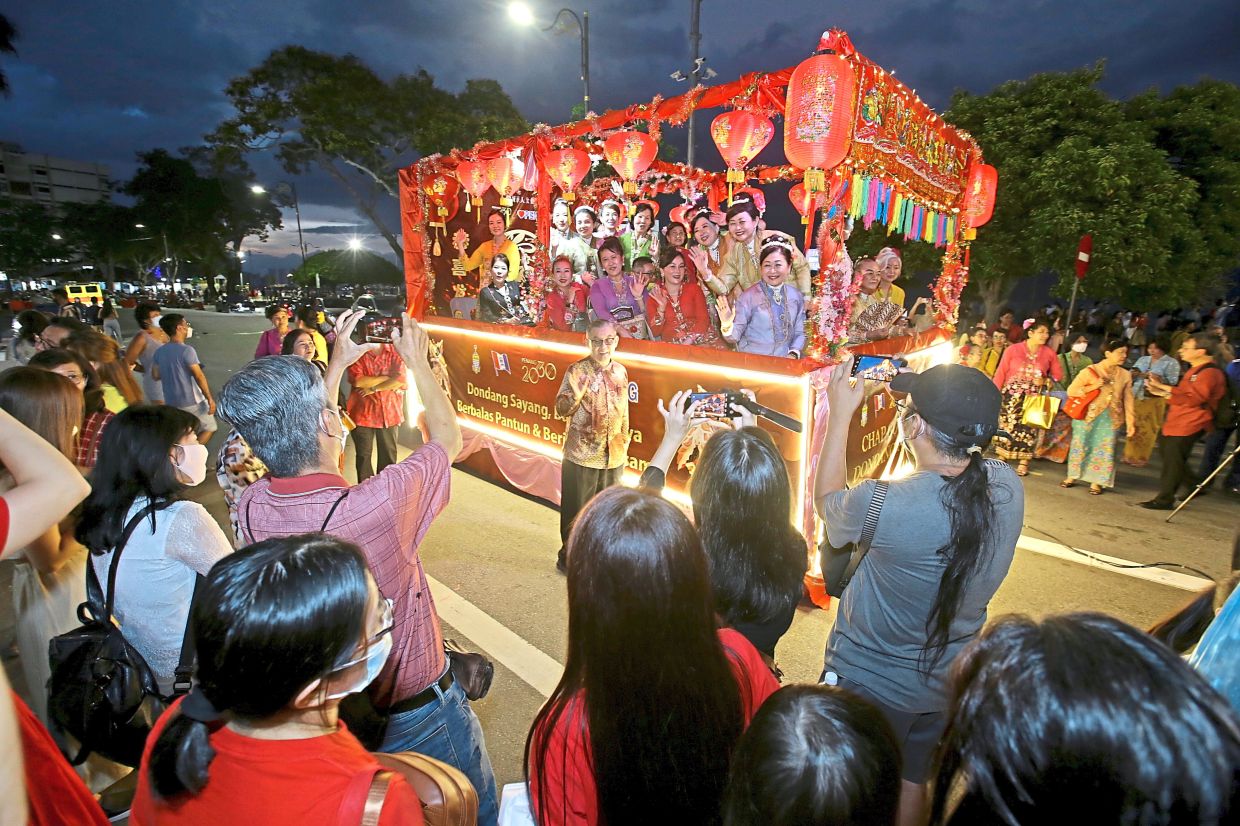PENANG’S rich cultural heritage was on full display during the Thaipusam and Chap Goh Meh celebrations which fell on the same weekend and drew large crowds.
Among the foreign tourists who witnessed the double celebrations was Gyula Reizeger, 24, a Dutch who found it an eye-opening experience.
“My girlfriend and I saw devotees carrying kavadi and breaking coconuts during the procession while at night, Chinese culture took centre stage with the hurling of mandarin oranges.
“We found these rituals fascinating.Today is our last day in Penang and we feel this is the best trip for us so far,” he said when met at the Esplanade during the Chap Goh Meh celebration.
Belgians Mael Heritier and his wife Camila Corset, both 34, said they would remember the wonderful experience for the rest of their lives.
“It was amazing to see the body-piercing feats and colourful chariot processions for Thaipusam plus the Chinese celebrating the 15th day of the lunar new year with so much pomp and gaiety.
“All the activities were carried out harmoniously,” said Heritier.
Corset echoed his sentiment, saying: “It is something we can’t wait to tell our family and friends back home.”
Sales manager Ooi Chee Wey, 44, who was spotted with his wife and two daughters, said it had been a while since Penang last celebrated the two festivals on such a grand scale.
“I didn’t want my daughters to miss out the opportunity to celebrate Chap Goh Meh.
“This is our heritage which I wish to pass on to them. I will tell them stories about the festivities, including Thaipusam,” he said.
Ooi, Reizeger and Heritier were among thousands of visitors who enjoyed the state-level “Experience Penang: Chap Goh Meh with A Bang” at the Esplanade on Sunday.
The event was also attended by Penang Chief Minister Chow Kon Yeow and his wife Tan Lean Kee, Local Government Development Minister Nga Kor Ming, Deputy Education Minister Lim Hui Ying and state tourism and creative economy committee chairman Yeoh Soon Hin, among other VIPs.
In his speech, Chow said Chap Goh Meh, also known as the Chinese Valentine’s Day, marked the 15th and last day of the Chinese New Year celebration period.
“The joyous occasion welcomes spring and symbolises new beginnings and growth.
“This is a time to reflect on the past, appreciate our blessings and look forward to opportunities in the coming year,” he said after witnessing the tim kam (Hokkien for throwing mandarin oranges into the sea), a Chap Goh Meh tradition believed to increase one’s chances of finding a good partner.
The turnout at the Chap Goh Meh event was encouraging, with the organisers estimating the number of attendees at nearly 50,000.
However, it had to be called off midway at 8pm due to heavy rain and strong winds.
Highlights of the evening were supposed to be a concert featuring top Malaysian artistes such as Shila Amzah and Vic Teo followed by the grand fireworks finale at 11pm.
Yeoh said the decision to postpone the activities until further notice was made after taking into consideration the safety of visitors.
Still, the Chap Goh Meh night ended on a high as The Top Penang was able to hold a spectacular fireworks display at 249m above sea level.
Feeling blessed
Among the dozens of kavadi bearers fulfilling their vows on Thaipusam was 37-year-old M. Prakash who had 500 koodam mul (small pots of milk) pierced into his body.
“I was married for six years and hoped for a baby. I am thankful to be blessed with a daughter.
“The doctor said our chances of having a child was less than 1%, so I prayed and made a vow.
“Miraculously, less than six months after the prayer, my child was naturally conceived,” said Prakash, who was accompanied by his now three-year-old daughter and other family members at the festival.
Due to the Covid-19 pandemic, Prakash was only able to fulfil his vow this year.
Devotees gathered at an empty area outside Sri Muthu Mariamman Temple in Lorong Kulit in the morning to perform prayers.
After going into a trance, they had hooks pierced through their flesh as a form of penance.
They then carried the kavadi on their shoulders and made their way barefooted to Arulmigu Sree Balathandayuthapani Waterfall Hilltop Temple.
They had to climb 513 steps up the hill to the temple’s main complex to pay homage to Lord Muruga.
Chants of “vel vel” and the beats from the dhol drums were heard far and wide as the devotees made their way to the temple.
Joining the kavadi bearers along Jalan Kebun Bunga were thousands of other devotees draped in vibrant clothing.
Some carried paal kudam (milk offerings) on their heads or shoulders while those who had shaved their head covered their scalp with sandalwood as a balm coating.
Stalls lining the road offered cold drinks and moru, a traditional blend of yogurt, water, salt and spices.
The Thaipusam celebration in Penang has been featuring two chariots during the procession since 2017 when the Penang Hindu Endowment Board rolled out its golden chariot.
This broke a 164-year tradition of the silver chariot being the only one seen at the festival.
The festival commemorates Lord Muruga’s victory over the demon Soorapadman by using the vel (spear) given by his mother, the Goddess Parvati.
Devotees thank Lord Muruga for granting their wishes and defeating the “daily demons” that plagued their lives, be they illnesses, career blocks or infertility.
They also ask forgiveness for transgressions as well as pray for blessings.
Bearing a kavadi is a sign of humility and devotion to Lord Muruga.
The kavadi, literally meaning “sacrifice at every step”, can be seen attached to devotees via hooks and thin spears that pierce their backs, cheeks and mouths.











